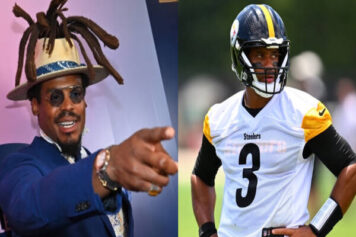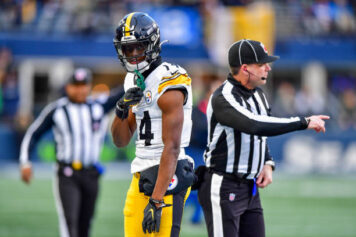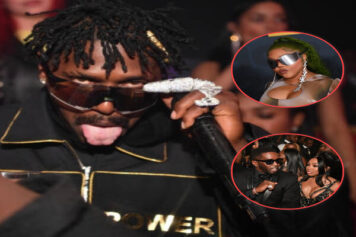Pittsburgh Steelers head coach Mike Tomlin isn’t here for your virtue signaling. As one of the most respected coaches in professional football, the Super Bowl-winning coach isn’t your Rooney Rule example.
He’s just a man with his feet on solid ground.
“I wouldn’t say I identify as the guy who’s the example of the rule,” said Tomlin on “The Pivot Podcast. “I’m thinking about coaches who I respect and who deserve the opportunity. When you talk about head football jobs in the NFL, you’re talking about being the best 32 at what you do.”
The “Rooney Rule” requires teams to interview minority coaches for vacancies, and many have made Tomlin and his success the “face” of that rule. Tomlin focuses not on being front and center but on the deserving coaches receiving their opportunity.
“I know that some of the guys who are being denied are in that top 32. For example, Raheem Morris is the best coach I’ve been around who doesn’t have a head job. I don’t have a problem saying it. I’ve been saying it.”
Tomlin changed the game when he hired former Miami Dolphins head coach Brian Flores, who sued the league for discrimination in their hiring practices. Despite not having an extensive personal relationship with Flores, Tomlin saw an opportunity to help out a coach and offer support for a fellow Black coach during a time when many in the league tried to avoid him.
Mike Tomlin with powerful words on his approach to coaching (via @thepivot).
"You can't do ordinary stuff and expect unique results." #Steelers pic.twitter.com/dUz65t0dQx
— Alex Kozora (@Alex_Kozora) June 21, 2022
“I had an opportunity to get a quality dude who is a more than capable coach at a discount,” said Tomlin. “What are we talking about? It’s crazy. I understand the other variables. I guess for me, for a period of time, I just refused to acknowledge that he wasn’t going to get another opportunity.
“I didn’t really meet him until he became head coach of the Dolphins. But when he filed that lawsuit, I just imagined that people were moving away from this dude, and I wanted him to know that I’m not moving away from him.”
Tomlin further explained how he advocated for Flores to Steelers’ ownership despite the climate swirling around him.
“I walked into [Steelers owner] Art Rooney’s office and said I had been talking to Brian Flores. I told him that this dude wants to coach football and I want to hire him. He said great. That was the extent of the conversation. It’s not complicated, this dude is an incredible football coach and a solid dude.”
Despite doctors giving the ok, Mike Tomlin on why he held Ryan Clark out of a game in Denver. Clark's sickle cell nearly killed him a few years prior (via @thepivot).
"It was my job to care about that dude in that moment. Even maybe more so than he cared about himself." pic.twitter.com/IwRhVkLgL6
— Alex Kozora (@Alex_Kozora) June 21, 2022
Living with an “each one teach one mentality” in coaching, Tomlin was raised right in the game. Early in his career, when he was just a 28-year-old on Tony Dungy’s Tampa Bay Buccaneers staff, he learned that being a coach on the highest level means being as human as possible.
He did not have the playing career he imagined as a wide receiver at the College of William and Mary, which fueled the coaching desire for Tomlin.
“My failures as a player, I could never live with,” said Tomlin. “I wanted to be a great player, and I wasn’t. I never got over that. I take that same energy into coaching. I think that’s why we all coach. We don’t want to admit it, but we coach because we can’t play. We could never play, or we can no longer play.
“I resist comfort. Ask the guys who play for me, one of my sayings is ‘don’t seek comfort.’ That’s a natural human condition. … You have to be comfortable being uncomfortable. I’ve trained myself over the years. Appreciating my résumé is seeking comfort. … It stings my ears. I’ve trained myself to hate it.”
Tomlin’s abilities as a head coach stem from his care for his athletes. Co-host, Ryan Clark, one of Tomlin’s former players on the Steelers, carries the sickle cell anemia trait, and Clark endured a scary medical episode playing in the thin air of Denver while with the team.
However, when a return trip to Denver was on the schedule, Clark lobbied Tomlin to be allowed to play. Tomlin admits that he had to ensure that he looked out for Clark’s well-being first, even if he was not.
“It was my job to care about that dude in that moment,” said Tomlin. “Even more than he maybe cared about himself. That’s leadership, right?
“I have an obligation to safeguard him to the best of my ability. Secondarily, I embrace the missionary component of my job. Yeah it’s my job, but it’s also my mission. It didn’t matter who was sitting in that chair under those variables, I’m responsible for that.”
Mike Tomlin opens up on The Pivot…and the conversation is unprecedented!
Tune in now🔥🔥https://t.co/BnPApl5kSS@Realrclark25 @FredTaylorMade @OfficialCrowder pic.twitter.com/lJRUpfm9pY
— Pivot Podcast (@thepivot) June 21, 2022
Tomlin took the Steelers to two Super Bowls, one they won in 2009 and one they lost in 2011. The coach’s reality of the loss never hit him until he returned home.
“I never considered losing, but when that confetti was coming down, and it wasn’t for us, we lost,” said Tomlin. “It didn’t hit me until I got back to Pittsburgh, sat back in this basement, and started thinking about the ramifications of losing that game. The gravity of everything that it meant, it was tough.
“When things are moving, I can hide behind taking care of others. When I got home, it was crazy. I realized what was lost. We’re talking lifetime scholarships and gold jackets. We win that game, and I believe that Hines Ward is in the Hall of Fame right now.”
Although Mike Tomlin doesn’t need your virtue signaling, he is the purest example of a good guy in a great position in professional football’s highest level.



